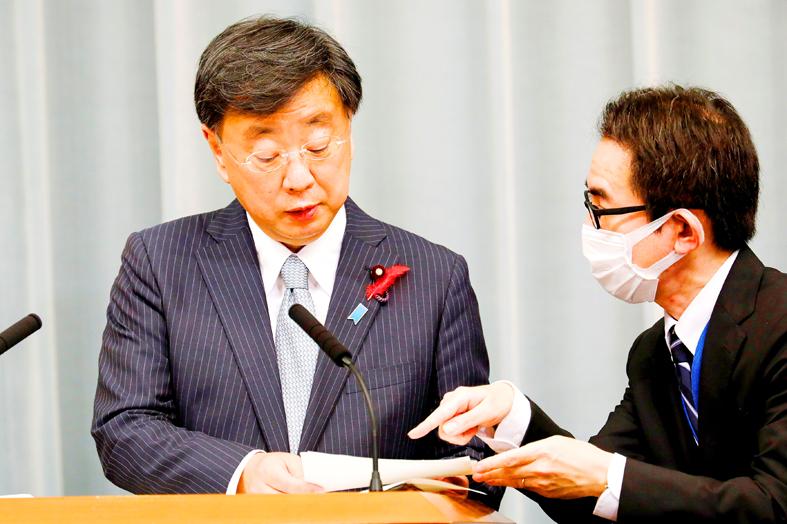The Japanese government yesterday said it would not send representatives to the Beijing Olympics as it called on China to respect human rights and the rule of law.
Government spokesman Hirokazu Matsuno did not describe the move as a diplomatic boycott — which has been announced by the US and others — but said there were “no plans” for officials to attend the Games.
“Japan believes it is important that common values shared by the international community, such as freedom, human rights and the rule of law, are also respected in China,” he said. “As Tokyo 2020 demonstrated to the world, the Olympics and the Paralympics are festivals of peace and sports.”

Photo: REUTERS
Australia, Canada, the UK and the Us this month announced diplomatic boycotts of the Beijing Olympics over what they consider to be widespread rights abuses by China, including against the Muslim Uighur minority.
Their boycott stops short of not sending athletes to the Games, which start on Feb. 4.
Beijing has said that the four nations would “pay the price” for the US-led campaign.
Japan, which hosted the Tokyo Olympics this year after the Games were postponed due to COVID-19, is in a tricky position as tensions simmer between the US and China, which are key trade partners.
Matsuno said that the decision had been made after “comprehensive” consideration, adding that Japan has held discussions with Chinese officials on human rights issues “at various levels.”
Tokyo 2020 Olympics Organizing Committee president Seiko Hashimoto and Japan Olympic Committee president Yasuhiro Yamashita would attend the Beijing Games.
“Hashimoto will attend to express gratitude and respect to the athletes and others who supported the Tokyo Games,” Matsuno said.
Japan Paralympic Committee president Kazuyuki Mori would attend the Beijing Winter Paralympics in March, he added.
Chinese Ministry of Foreign Affairs spokesman Zhao Lijian (趙立堅) said Beijing “welcomes the Japanese Olympic Committee and other relevant officials, as well as Japanese athletes,” but urged “the Japanese side to honor promises to support each other in hosting the Olympic Games and to not politicize sports.”

Right-wing political scientist Laura Fernandez on Sunday won Costa Rica’s presidential election by a landslide, after promising to crack down on rising violence linked to the cocaine trade. Fernandez’s nearest rival, economist Alvaro Ramos, conceded defeat as results showed the ruling party far exceeding the threshold of 40 percent needed to avoid a runoff. With 94 percent of polling stations counted, the political heir of outgoing Costa Rican President Rodrigo Chaves had captured 48.3 percent of the vote compared with Ramos’ 33.4 percent, the Supreme Electoral Tribunal said. As soon as the first results were announced, members of Fernandez’s Sovereign People’s Party

MORE RESPONSIBILITY: Draftees would be expected to fight alongside professional soldiers, likely requiring the transformation of some training brigades into combat units The armed forces are to start incorporating new conscripts into combined arms brigades this year to enhance combat readiness, the Executive Yuan’s latest policy report said. The new policy would affect Taiwanese men entering the military for their compulsory service, which was extended to one year under reforms by then-president Tsai Ing-wen (蔡英文) in 2022. The conscripts would be trained to operate machine guns, uncrewed aerial vehicles, anti-tank guided missile launchers and Stinger air defense systems, the report said, adding that the basic training would be lengthened to eight weeks. After basic training, conscripts would be sorted into infantry battalions that would take

GROWING AMBITIONS: The scale and tempo of the operations show that the Strait has become the core theater for China to expand its security interests, the report said Chinese military aircraft incursions around Taiwan have surged nearly 15-fold over the past five years, according to a report released yesterday by the Democratic Progressive Party’s (DPP) Department of China Affairs. Sorties in the Taiwan Strait were previously irregular, totaling 380 in 2020, but have since evolved into routine operations, the report showed. “This demonstrates that the Taiwan Strait has become both the starting point and testing ground for Beijing’s expansionist ambitions,” it said. Driven by military expansionism, China is systematically pursuing actions aimed at altering the regional “status quo,” the department said, adding that Taiwan represents the most critical link in China’s

‘REALLY PROUD’: Nvidia would not be possible without Taiwan, Huang said, adding that TSMC would be increasing its capacity by 100 percent Nvidia Corp CEO Jensen Huang (黃仁勳) on Saturday praised and lightly cajoled his major Taiwanese suppliers to produce more to help power strong demand for artificial intelligence (AI), capping a visit to the country of his birth, where he has been mobbed by adoring fans at every step. Speaking at an impromptu press conference in the rain outside a Taipei restaurant, where he had hosted suppliers for a “trillion-dollar dinner,” named after the market capitalization of those firms attending, Huang said this would be another good year for business. “TSMC needs to work very hard this year because I need a lot